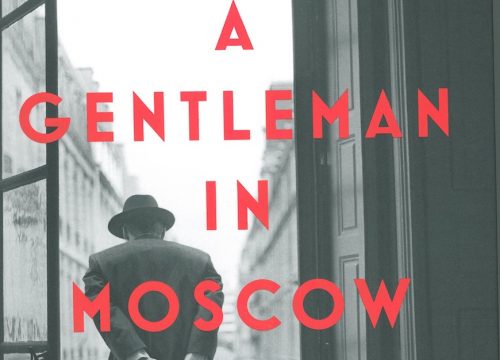“A Gentleman in Moscow” by Amor Towles; Viking Publishers; September 2016; 480 pp; $27
By Ann Jonas
For The Visitor
Author Amor Towles made a name for himself when his first novel, “The Rules of Civility,” became a bestseller soon after it was published in 2011. His latest work of fiction, “A Gentleman in Moscow,” is another splendid historical tale, this time set in Moscow, shortly after the Bolshevik revolution.
The novel begins in 1922, with Count Alexander Ilyich Rostov, a 30-year-old Russian aristocrat, appearing before a Bolshevik tribunal, accused of writing a poem that was seen as disloyal to the ruling party. Because some members of the tribunal consider him a hero of the prerevolutionary cause, Rostov avoids the firing squad and instead is sentenced to house arrest. The tribunal tells him that if he sets foot outside the grand Metropol Hotel, which has been his home since 1918, he will be shot.
 “A Gentleman in Moscow” follows Count Rostov’s life in the Metropol, which is across the street from the Kremlin, from 1922 to the summer of 1954 and through some interesting years in Russian history. Rostov is accustomed to having the finer things in life, having lived in a posh third-floor suite furnished with classic furniture he brought with him from his family estate in western Russia. After his house arrest, the well-educated and clever man of culture is forced to live in a small attic room in the Metropol.
“A Gentleman in Moscow” follows Count Rostov’s life in the Metropol, which is across the street from the Kremlin, from 1922 to the summer of 1954 and through some interesting years in Russian history. Rostov is accustomed to having the finer things in life, having lived in a posh third-floor suite furnished with classic furniture he brought with him from his family estate in western Russia. After his house arrest, the well-educated and clever man of culture is forced to live in a small attic room in the Metropol.
Rostov settles in his new space with grace and dignity, “having acknowledged that a man must master his circumstances or otherwise be mastered by them.” He meets a variety of hotel guests, builds friendships with a number of hotel staff and enjoys visits from several old friends. Early on, he encounters Nina, a precocious 9-year-old who is a long-term guest at the Metropol; she and the count become fast friends.
Towles’ characters are colorful, witty and diverse and include a beautiful actress, a temperamental chef, a seamstress, a barber and the maître d’hôtel. Rostov’s relationships with them are entertaining; his friendship with Nina is endearing. Another young girl enters the narrative later when Rostov is called upon to look after her as a favor to an old friend. In spite of his confinement, Rostov remains a good-hearted — though eccentric — gentleman throughout the book; readers will grow quite fond of him.
“A Gentleman in Moscow” has been on the national independent booksellers’ bestseller list for the past 50 weeks — essentially since it was published. This sophisticated but charming novel has intrigue, romance, literary and cinematic references and is a delight to read. It contains a great amount of wisdom, rich prose and a memorable story line.
Towles was an investment professional for more than 20 years, but now writes full time. According to his website, Towles wrote his latest novel because of his “longstanding fascination with Russian literature, culture, and history.” His goal when writing is “to create a work of art that, while being satisfyingly cohesive, contains such a richness of images, ideas, and personalities that it can prompt varied responses from reader to reader, and from reading to reading.” In “A Gentleman in Moscow,” Towles most definitely met that goal.
Ann Jonas is the general book buyer for the College of St. Benedict and St. John’s University.























Regarding A Gentleman In Moscow
It was a great read. BUT – On page 280 the author mentions “the ambassador from the Vatican” and from who’s apartment in the scene about the geese, where one of the geese slips into the “prelates” apartment and whereupon “a young woman, who was decidedly not a representative of the Roman Catholic Church, came racing into the hallway wrapped only in a blue kimono.”
Point one – There was no Vatican ambassador to the Soviet Union circa 1946 and would be none until 2009. There was a priest – Father Braun – the US Embassy’s chaplain from 1934 – 1946 – and appointed an apostolic administrator by the Holy See. He lived at the Embassy. The Italian/French Embassies’s also may have had a priest in residence.
Point two – Regarding the “young woman.” To describe a past event using the present problems of the Church, I found a cheap shot.